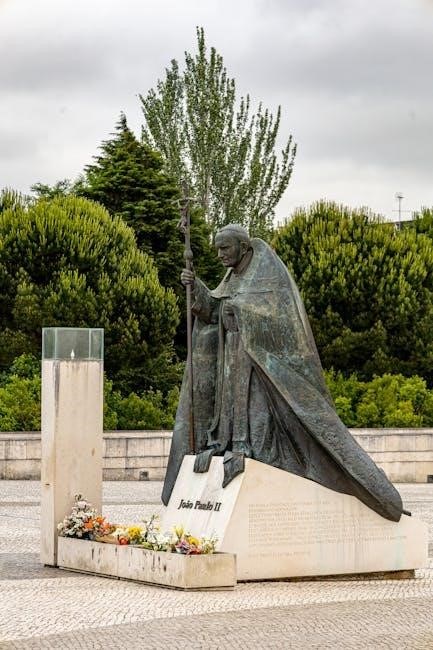Pope Shenouda III, the 117th Pope of Alexandria, was a revered Coptic Orthodox leader, renowned for his deep theological insights and literary contributions. His writings, including 30 Steps to Heaven, guide believers in spiritual ascent, blending traditional teachings with contemporary relevance.
Early Life and Education of Pope Shenouda III
Pope Shenouda III was born on August 3, 1923, in Assiut, Egypt. His early life was marked by a deep commitment to faith, leading him to pursue higher religious education. He studied English literature and history at Cairo University in the 1940s, which shaped his intellectual and theological foundation. After completing his studies, he embraced monastic life, becoming a monk and later a bishop. His educational background and spiritual dedication prepared him to lead the Coptic Orthodox Church as its 117th Pope, beginning in 1971. This period of growth and learning laid the groundwork for his influential writings, including 30 Steps to Heaven, which reflects his scholarly and spiritual insights.
Significance of Pope Shenouda III in Coptic Christianity
Pope Shenouda III holds immense significance in Coptic Christianity as a spiritual leader, scholar, and advocate for unity. His extensive writings, including 30 Steps to Heaven, provided accessible spiritual guidance, blending monastic traditions with modern contexts. He emphasized the importance of personal faith, repentance, and humility, resonating deeply with believers worldwide. His leadership strengthened the Coptic Orthodox Church, fostering global connections and preserving its traditions. Through his teachings, he inspired a generation to seek a closer relationship with God, ensuring his legacy endures as a cornerstone of Coptic spirituality and a bridge between ancient faith and contemporary life.

Overview of “30 Steps to Heaven”
30 Steps to Heaven by Pope Shenouda III is a spiritual guide inspired by the Ladder of Divine Ascent, offering practical steps for spiritual growth and divine connection.
Concept and Inspiration Behind the Book
Pope Shenouda III’s 30 Steps to Heaven draws inspiration from the classic spiritual text The Ladder of Divine Ascent by St. John Climacus. The book adapts this ancient monastic wisdom to guide modern believers in their spiritual journey. Rooted in biblical teachings, it emphasizes humility, repentance, and self-discovery as essential steps toward divine communion. The concept is deeply influenced by John 3:30, which highlights humility as a cornerstone of Christ-like living. The book also reflects Luke 1:29-30, illustrating Mary’s surrender to God’s will as a model for spiritual ascent. By blending scriptural insights with practical advice, Pope Shenouda provides a clear pathway for believers to draw closer to heaven, making the teachings accessible and relevant for contemporary spiritual seekers.
Structure and Key Themes of the Book
30 Steps to Heaven is structured as a spiritual guide, divided into 30 concise steps that mirror the Ladder of Divine Ascent. Each step builds on the previous one, offering practical advice for spiritual growth. Key themes include humility, repentance, and self-discovery, with a strong emphasis on prayer and fasting as tools for drawing closer to God. The book integrates biblical references, such as John 3:30, which underscores humility, and Luke 1:29-30, which exemplifies surrender to God’s will. These themes are woven together to create a pathway for believers to ascend spiritually, fostering a deeper relationship with God and ultimately achieving divine communion. The structure is designed to be accessible, making ancient spiritual wisdom applicable to modern life.
Foundational Principles of the 30 Steps
The 30 Steps are rooted in the Ladder of Divine Ascent, emphasizing repentance, humility, and self-discovery. Biblical references guide the journey, fostering spiritual growth and divine communion.
The Ladder of Divine Ascent and Its Influence
The Ladder of Divine Ascent, written by St. John Climacus, is a foundational text for monastic spirituality, outlining a step-by-step path to spiritual perfection. Pope Shenouda III drew inspiration from this classic work, adapting its principles for modern believers in 30 Steps to Heaven. The ladder metaphor represents the ascent of the soul toward God, with each rung symbolizing a virtue or challenge to overcome. This timeless guide has profoundly influenced both monastic and lay Christians, offering practical wisdom for repentance, humility, and self-discovery. Its enduring relevance lies in its universal appeal, bridging centuries to remain a cornerstone of spiritual growth.
Repentance as the First Step to Heaven
Repentance is the cornerstone of spiritual journey, emphasized by Pope Shenouda III as the first step toward heaven. It involves recognizing sin, confessing it, and turning back to God with a sincere heart. Rooted in biblical teachings, such as John 3:30, repentance reflects humility and surrender to God’s will. Pope Shenouda taught that true repentance is not merely emotional but a conscious decision to align one’s life with divine principles. This step fosters a deep sense of cleansing and renewal, enabling believers to embark on their spiritual ascent. By prioritizing repentance, Pope Shenouda underscored its transformative power in drawing individuals closer to God and paving the way for a life of faith and virtue.
Spiritual Growth and Self-Discovery
Spiritual growth and self-discovery are central to Pope Shenouda III’s teachings, emphasizing introspection, humility, and a deep connection with God. These principles guide believers toward inner transformation and divine communion.
Understanding Human Nature and Sin
Pope Shenouda III emphasizes that understanding human nature and sin is foundational for spiritual growth. He teaches that humans, created in God’s image, possess both divine and earthly tendencies. Sin, rooted in self-will and disobedience, separates individuals from God, hindering their spiritual ascent. Recognizing sin’s presence and its consequences is crucial for repentance and redemption. Shenouda highlights that sin distorts human nature, leading to spiritual death, but through faith and humility, believers can reclaim their divine likeness. This understanding fosters self-awareness and the need for constant spiritual warfare against sinful desires, aligning with the teachings of the “30 Steps to Heaven,” which guide believers toward purity and unity with God.
The Role of Faith in Spiritual Ascent
Faith is a cornerstone of spiritual ascent, according to Pope Shenouda III. He underscores that faith is not merely intellectual belief but a living, dynamic relationship with God. In “30 Steps to Heaven,” Shenouda teaches that faith empowers believers to transcend earthly limitations and seek divine communion. It is through faith that one overcomes doubts, fears, and uncertainties, trusting in God’s providence. Faith also illuminates the path to heaven, guiding individuals through life’s challenges. Shenouda emphasizes that faith must be accompanied by works, as it is active and transformative. By nurturing faith, believers can ascend spiritually, drawing closer to God and realizing their ultimate goal of heavenly union.
Biblical References in the 30 Steps
Pope Shenouda III’s “30 Steps to Heaven” richly incorporates biblical verses, such as John 3:30 and Luke 1:29-30, to illustrate spiritual truths and guide believers toward divine communion.
John 3:30 and the Humility of Christ
John 3:30, “He must increase, but I must decrease,” is a cornerstone of Pope Shenouda III’s teachings on humility. This verse reflects Christ’s selflessness and surrender to God’s will, embodying the essence of spiritual humility. In 30 Steps to Heaven, Pope Shenouda emphasizes that true humility is not self-deprecation but recognizing one’s role in God’s plan. He links this verse to the Ladder of Divine Ascent, highlighting how diminishing oneself allows God to increase, fostering a deeper relationship with Him. This principle guides believers to embrace humility as a foundational virtue for spiritual growth and divine communion, mirroring Christ’s example of surrender and love.
Luke 1:29-30 and the Annunciation
Luke 1:29-30 describes Mary’s response to the angel Gabriel, “Do not be afraid, Mary, for you have found favour with God.” This passage, highlighted in Pope Shenouda III’s teachings, exemplifies humility and faith. Mary’s acceptance of God’s will, despite uncertainty, is seen as a model of surrender. In 30 Steps to Heaven, Pope Shenouda uses this narrative to illustrate the importance of trusting God’s plan. He emphasizes that, like Mary, believers must embrace divine calling with courage and obedience, fostering a spirit of submission and faith. This biblical event serves as a powerful lesson in spiritual ascent, encouraging believers to align their will with God’s purpose.

The Role of Fasting and Prayer
Fasting and prayer are essential practices in Pope Shenouda III’s teachings, fostering spiritual purification and closeness to God. They help believers reflect, repent, and seek divine guidance.
Pope Shenouda’s Teachings on Fasting
Pope Shenouda III emphasized fasting as a vital spiritual practice, fostering self-reflection, humility, and detachment from worldly desires. He taught that fasting is not merely abstaining from food but a means to purify the soul, allowing believers to focus on prayer and divine connection. In his writings, Shenouda highlighted fasting as a tool to overcome sin and grow closer to God, aligning with biblical teachings such as John 3:30, which underscores humility and surrender. He encouraged moderation and balance, ensuring fasting is accompanied by prayer and a sincere desire to draw nearer to heaven. This practice, he explained, strengthens the spirit and prepares the heart for eternal communion with God.
Prayer as a Means of Drawing Closer to Heaven
Pope Shenouda III underscored prayer as a direct and intimate communication with God, essential for spiritual growth. He taught that prayer aligns one’s will with God’s, fostering humility and surrender. Through prayer, believers seek guidance, express gratitude, and deepen their relationship with the divine. Shenouda emphasized that prayer is not merely a ritual but a heartfelt dialogue, enabling individuals to overcome sin and draw closer to heaven. He encouraged believers to pray with sincerity, persistence, and faith, trusting in God’s providence. Prayer, he explained, is a lifelong journey that strengthens the soul and prepares it for eternal communion with God.
The Concept of Heaven in Coptic Theology
Heaven in Coptic theology, as taught by Pope Shenouda III, is a state of eternal divine communion, where believers unite with God and the saints, living in His presence forever.
Heaven as a State of Divine Communion
In Coptic theology, heaven is often described as a state of divine communion, where believers experience eternal unity with God and the saints. This communion is rooted in love, peace, and joy, reflecting God’s eternal nature. According to Pope Shenouda III, heaven is not merely a physical place but a spiritual state of being in God’s presence. The 30 Steps to Heaven emphasize that this communion begins on earth through prayer, repentance, and a life of faith. It is in heaven that this relationship reaches its fullest expression, where believers participate in the divine life, worshipping and glorifying God forever.
The Role of Saints and Martyrs in Heaven
In Coptic theology, saints and martyrs hold a special place in heaven, serving as intercessors and examples of faith. Their lives, marked by devotion and sacrifice, inspire believers to pursue spiritual growth. Martyrs, in particular, are venerated for their unwavering commitment to their faith, even in the face of death. According to Pope Shenouda III, saints in heaven shine like stars, reflecting God’s glory. Their role is not only to glorify God but also to pray for the church on earth, fostering a sense of unity between heaven and earth. Their stories and virtues encourage believers to emulate their faithfulness, striving for a similar closeness to God.

Practical Steps to Spiritual Enlightenment
Pope Shenouda III’s “30 Steps to Heaven” offers practical guidance for spiritual growth, inspired by “The Ladder of Divine Ascent,” providing actionable steps for a closer walk with God.
Step 1: Recognizing One’s True Self
Recognizing one’s true self is the foundational step in Pope Shenouda III’s “30 Steps to Heaven.” This step emphasizes understanding humanity’s divine origin and purpose. According to the teachings, individuals must acknowledge their identity as beings created in God’s image, separating their true selves from worldly influences. This recognition fosters humility and self-awareness, enabling believers to align their lives with divine will. Pope Shenouda underscores the importance of this step as a precursor to spiritual growth, urging followers to embrace their sacred nature and reject sin. By doing so, they can embark on the journey toward heaven, guided by a profound understanding of their true identity.
Step 2: Overcoming Sin and Weakness
Step 2 in Pope Shenouda III’s “30 Steps to Heaven” focuses on overcoming sin and weakness, emphasizing repentance and spiritual purification. Recognizing sin’s separation from God, believers must confront their flaws humbly. This step involves acknowledging sins, seeking forgiveness, and renouncing worldly desires. Pope Shenouda teaches that true repentance leads to inner transformation, enabling individuals to align their will with God’s. The process requires self-reflection, confession, and a commitment to change. By overcoming sin, believers strengthen their spiritual foundation, paving the way for further ascent toward heaven. This step underscores the necessity of moral and spiritual cleansing as essential for profound faith and intimacy with God.

The Importance of Humility
Humility is the cornerstone of spiritual growth, reflecting Christ’s character and fostering a deeper relationship with God, as emphasized in Pope Shenouda III’s teachings.
Humility as a Foundation for Spiritual Growth
Humility is the cornerstone of spiritual ascent, as it allows believers to recognize their limitations and dependence on God. Pope Shenouda III emphasizes that true humility mirrors Christ’s self-emptying love, as seen in John 3:30, where He said, “He must increase, but I must decrease.” This virtue fosters self-reflection, acknowledging human frailty, and opens hearts to divine grace. Without humility, one cannot genuinely recognize their true self or overcome sin. It is through humility that believers can embark on the journey outlined in 30 Steps to Heaven, embracing a life of repentance, faith, and communion with God. Thus, humility is not just a virtue but a necessity for spiritual transformation and growth.
Examples of Humility in Biblical and Coptic Traditions
Humility is vividly illustrated in both biblical narratives and Coptic traditions. In the Bible, Christ’s humility is exemplified in John 3:30, where He declares, “He must increase, but I must decrease,” reflecting self-emptying love. Similarly, the Virgin Mary’s humble response to the Annunciation in Luke 1:29-30, “Behold, I am the servant of the Lord,” sets a profound example of surrender and trust in God’s will. In Coptic tradition, saints and martyrs embody humility, offering their lives for their faith without seeking glory. These examples highlight humility as a cornerstone of spiritual life, aligning with Pope Shenouda III’s teachings on the path to heaven. Such humility inspires believers to emulate these virtues in their own journeys toward divine communion.
Dealing with Temptation and Sin
Temptation tests faith, often leading to spiritual separation. Recognizing sin’s impact, individuals must seek repentance and divine grace to overcome weakness, aligning with Pope Shenouda’s teachings on spiritual resilience and the importance of prayer in combating temptation.
The Nature of Temptation and Its Impact
Temptation, as described by Pope Shenouda III, is a test of faith and will, often arising from internal desires or external pressures. It creates a spiritual conflict, pulling individuals away from God and toward sin. The impact of temptation is profound, leading to spiritual separation and a diminished relationship with the divine. If succumbed to, it results in sin, which hinders spiritual growth and the journey toward heaven. Pope Shenouda emphasizes that temptation itself is not sin but becomes so when acted upon. Recognizing the nature of temptation is crucial for spiritual resilience, as it reveals human weakness and the need for repentance and divine grace.

Strategies for Overcoming Temptation
Pope Shenouda III emphasizes prayer and fasting as vital tools to resist temptation. Prayer strengthens the soul, while fasting weakens the flesh, reducing the influence of sinful desires. Seeking guidance from spiritual fathers and engaging in regular confession also play crucial roles. Aligning one’s will with God’s will is essential, as temptation often arises from human desires conflicting with divine purpose. Humility and self-awareness are key, as recognizing one’s weaknesses allows for better resistance against sin. The Holy Spirit empowers believers to overcome temptation by living according to God’s commandments. Ultimately, persistent repentance and faith in God’s grace are the cornerstone of triumphing over temptation and drawing closer to heaven.
The Role of the Holy Spirit
The Holy Spirit guides believers toward heaven, empowering them to live virtuously and resist sin. Through divine communion, the Spirit transforms the soul, aligning human will with God’s purpose.
The Holy Spirit as a Guide to Heaven

The Holy Spirit serves as the divine guide on the journey to heaven, illuminating the path and nurturing spiritual growth. According to Pope Shenouda III, the Spirit transforms the soul, enabling believers to embrace virtues like humility and love. By dwelling within individuals, the Holy Spirit empowers them to overcome sin and align their will with God’s. This divine presence fosters a deep communion with God, essential for ascending the ladder to heaven. The Spirit’s role is both transformative and comforting, leading believers through the 30 steps toward eternal life and union with the Father.

The Connection Between the Holy Spirit and Human Will
The interplay between the Holy Spirit and human will is central to Pope Shenouda III’s teachings. The Holy Spirit guides individuals toward divine truths, aligning their will with God’s purpose. This synergy enables believers to transcend worldly desires and embrace a life of righteousness. By surrendering human will to the Spirit’s influence, one attains spiritual harmony and progresses along the 30 steps to heaven. The relationship is transformative, empowering individuals to live according to God’s plan and fostering a deeper connection with the divine. This connection is vital for spiritual growth and eternal communion with God.

Maintaining a Spiritual Life
Maintaining a spiritual life involves consistent prayer, fasting, and communion with God. These practices, as taught by Pope Shenouda III, foster a deep, enduring connection with the divine.
Daily Practices for Spiritual Growth
Daily practices for spiritual growth, as emphasized by Pope Shenouda III, include consistent prayer, fasting, and reflection. These disciplines help believers cultivate a deeper connection with God and foster self-awareness. Prayer, particularly, is seen as a means of drawing closer to heaven, while fasting strengthens the spirit and purifies the heart. Additionally, recognizing one’s true identity as a child of God is crucial for spiritual ascent. Overcoming sin through repentance and seeking divine grace are essential steps in this journey. The Coptic tradition also highlights the importance of community in supporting individual spiritual growth, encouraging believers to walk together in faith and humility.

The Importance of Community in Spiritual Journey
The spiritual journey emphasized by Pope Shenouda III is deeply rooted in the value of community. Believers are encouraged to walk together in faith, supporting one another through shared practices and mutual encouragement. Collective worship, prayer, and fellowship strengthen individuals and foster a sense of unity. Community serves as a safeguard against isolation, providing a network of love and accountability. By gathering in prayer and sharing spiritual experiences, believers reflect the divine love that binds them. This communal approach to spirituality not only enhances personal growth but also mirrors the heavenly communion that believers aspire to attain. Through shared traditions and collective efforts, the Coptic community embodies the essence of spiritual ascent together.
Pope Shenouda III’s 30 Steps to Heaven offers a profound guide to spiritual ascent, emphasizing repentance, humility, and divine communion. His teachings continue to inspire believers in their journey toward eternal grace and unity with God, leaving a lasting legacy in Coptic Christianity.
Summarizing the 30 Steps to Heaven
Pope Shenouda III’s 30 Steps to Heaven is a spiritual guide inspired by the Ladder of Divine Ascent, offering a structured path to divine communion. Each step represents a progression in spiritual growth, emphasizing repentance, humility, and faith. The book draws on biblical teachings, such as John 3:30, which highlights Christ’s humility, and Luke 1:29-30, reflecting on the Annunciation. It encourages believers to recognize their true selves, overcome sin, and cultivate a deeper relationship with God. Practical steps include daily practices like prayer and fasting, while emphasizing the importance of community and the Holy Spirit’s guidance. The book serves as a timeless resource for spiritual ascent, available as a free PDF, making its wisdom accessible to all seekers of heaven.
The Enduring Legacy of Pope Shenouda III’s Teachings
Pope Shenouda III’s teachings continue to profoundly influence Coptic Christianity and global spirituality. His works, such as 30 Steps to Heaven, remain essential guides for seekers of divine truth. By blending monastic traditions with contemporary relevance, he made complex theological concepts accessible. His emphasis on humility, faith, and the Holy Spirit’s role resonates universally. The book’s availability as a free PDF ensures its reach, impacting diverse audiences. Shenouda’s legacy endures through his writings, fostering spiritual growth and a deeper connection to God. His contributions to Coptic theology and Christian thought are timeless, inspiring future generations to pursue heavenly communion and a life of faith and virtue.
